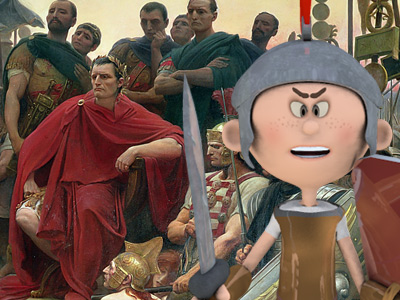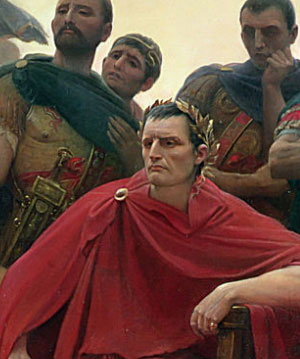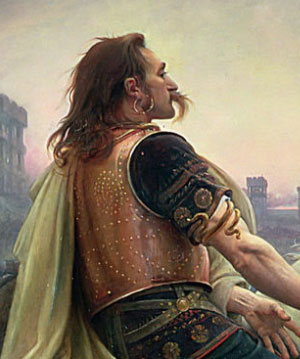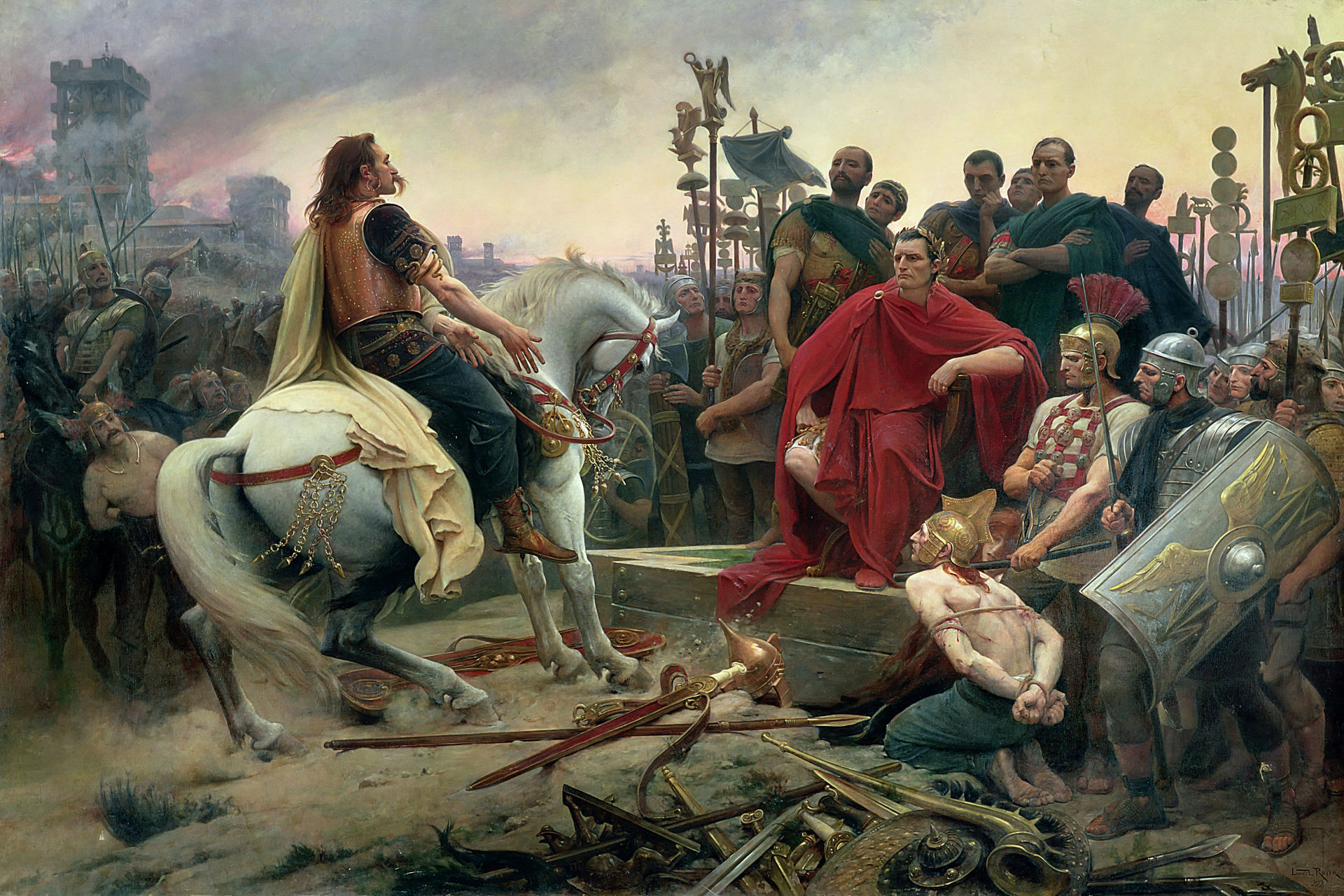Gallic Wars (58–50 BC)
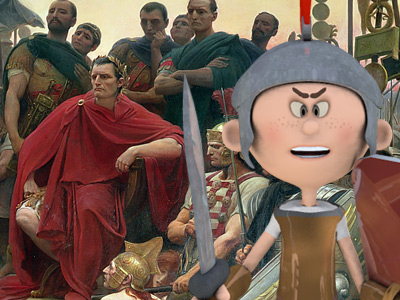
Campaign against the Belgae
In 57 BC Caesar once again intervened in an intra-Gallic conflict, marching against the Belgae, who inhabited the area roughly bounded by modern-day Belgium. The Belgae had recently attacked a tribe allied with Rome and before marching out with his army to meet them, Caesar ordered the Remi and other neighbouring Gauls to investigate the Belgae's actions. His army suffered a surprise attack in the battle of the Sabis while it was making camp near the river Sambre.
The Nervii advanced so quickly that Caesar did not have the time to organise his forces and nearly suffered a humiliating defeat. Caesar admits to losing all of his standards and most his centurions dead or felled by wounds. He himself was forced to take up a shield and personally rally his forces which were then threatened with envelopment and massacre. The strong stand by the X legion and the prompt arrival of reinforcements enabled Caesar to regroup, redeploy and eventually repulse the Nervii once the Atrebates and Viromandui were put to flight.
Caesar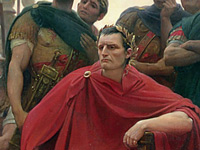 Julius Caesar (100-44 BC), was a Roman politician and general who played a critical role in the events that led to the demise of the Roman Republic and the rise of the Roman Empire. Caesar is considered by many historians to be one of the greatest military commanders in history. Julius Caesar » remarked that the warlike Nervii refused to yield their ground even after the Atrebates and Virumandui had been put into disarray. When finally surrounded by Roman reinforcements the Nerviians continued fighting as a pitiless hail of missiles rained down on them from the many archers and peltasts Caesar had brought from overseas. The peltasts, slingers and archers were brought for the specific purpose of confounding the Gallic proclivity for shield wall tactics, mass attack and individual close combat.
Julius Caesar (100-44 BC), was a Roman politician and general who played a critical role in the events that led to the demise of the Roman Republic and the rise of the Roman Empire. Caesar is considered by many historians to be one of the greatest military commanders in history. Julius Caesar » remarked that the warlike Nervii refused to yield their ground even after the Atrebates and Virumandui had been put into disarray. When finally surrounded by Roman reinforcements the Nerviians continued fighting as a pitiless hail of missiles rained down on them from the many archers and peltasts Caesar had brought from overseas. The peltasts, slingers and archers were brought for the specific purpose of confounding the Gallic proclivity for shield wall tactics, mass attack and individual close combat.
The Nervii were especially renowned for skills at warfare. They ruled and subsisted by warfare and by taxing their dependent and client tribes while adhering to a heroic hoplitic tradition. These Gallic conventions were something Caesar exploited as often as he could.
Together with Caesar's prudent and unabashed use of fixed projectile weapons like the "scorpion" and light ballista, the archers and peltasts took a heavy toll on the densely packed Nervii, who themselves shunned all projectile weapons but the lance. It is recorded in Caesar's war commentaries that as the battle raged, the Nervii caught Roman javelins in flight and hurled them back at legionnaires and that although all were eventually slain, not one of the Nervii was seen to flee. As the grim fighting wore on, the Nervii refused to yield and mounds of the fallen formed ramparts and Boduognatus' fighters fought from atop these hills of dead, clashing with the pressing Roman ranks again and again.
The skill with which the veteran Roman The Roman Republic was a form of government of Rome and the era of the classical Roman civilization when it was run through public representation of the Roman people. Beginning with the overthrow of the Roman Kingdom (traditionally dated to 509 BC) and ending in 27 BC with the establishment of the Roman Empire, Rome's control rapidly expanded during this period - from the city's immediate surroundings to hegemony over the entire Mediterranean world. legions executed their well practiced pilum barrage and gladius and scutum counter-attacks together with the prudent use of missile weapons was instrumental in defeating the skillful and daring Nervii and associated Belgae.
The Roman Republic was a form of government of Rome and the era of the classical Roman civilization when it was run through public representation of the Roman people. Beginning with the overthrow of the Roman Kingdom (traditionally dated to 509 BC) and ending in 27 BC with the establishment of the Roman Empire, Rome's control rapidly expanded during this period - from the city's immediate surroundings to hegemony over the entire Mediterranean world. legions executed their well practiced pilum barrage and gladius and scutum counter-attacks together with the prudent use of missile weapons was instrumental in defeating the skillful and daring Nervii and associated Belgae.
The Belgae suffered heavy losses and eventually surrendered when faced with the destruction of their towns. The Nervii were severely mauled and forced to flee; thereby all former client tribes surrendered to Caesar or likewise fled. Their absence gave Caesar control of most of what is now Belgium Belgium, officially the Kingdom of Belgium, is a country in Northwestern Europe. The country as it exists today was established following the 1830 Belgian Revolution. Belgium has also been the battleground of European powers, earning the moniker the "Battlefield of Europe", a reputation reinforced in the 20th century by both world wars..
Belgium, officially the Kingdom of Belgium, is a country in Northwestern Europe. The country as it exists today was established following the 1830 Belgian Revolution. Belgium has also been the battleground of European powers, earning the moniker the "Battlefield of Europe", a reputation reinforced in the 20th century by both world wars..
HISTORY
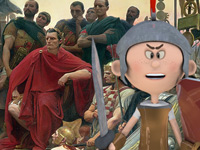
RESOURCES
This article uses material from the Wikipedia article "Gallic Wars", which is released under the Creative Commons Attribution-Share-Alike License 3.0.
© Stories Preschool. All Rights Reserved.
